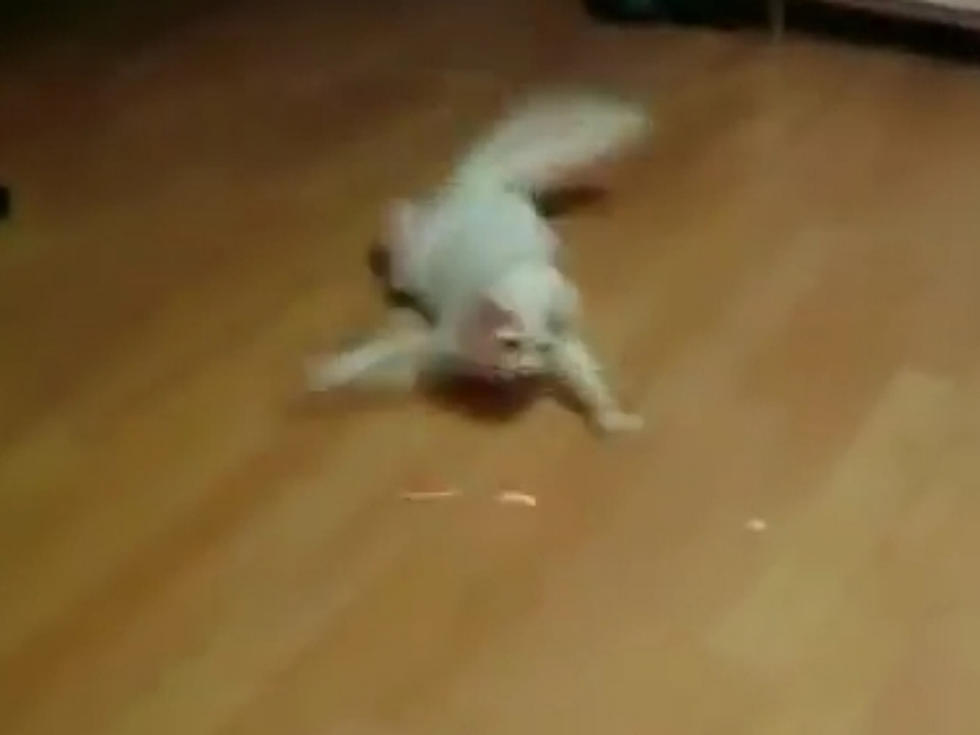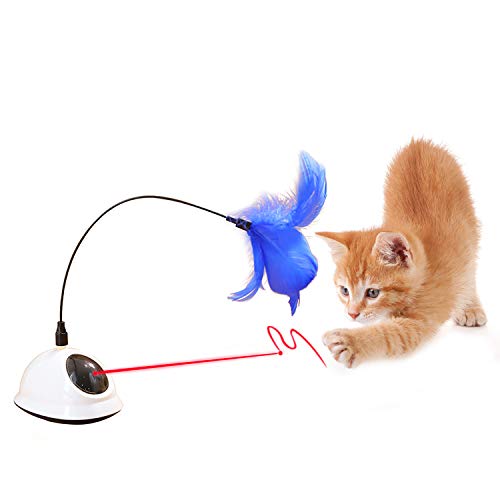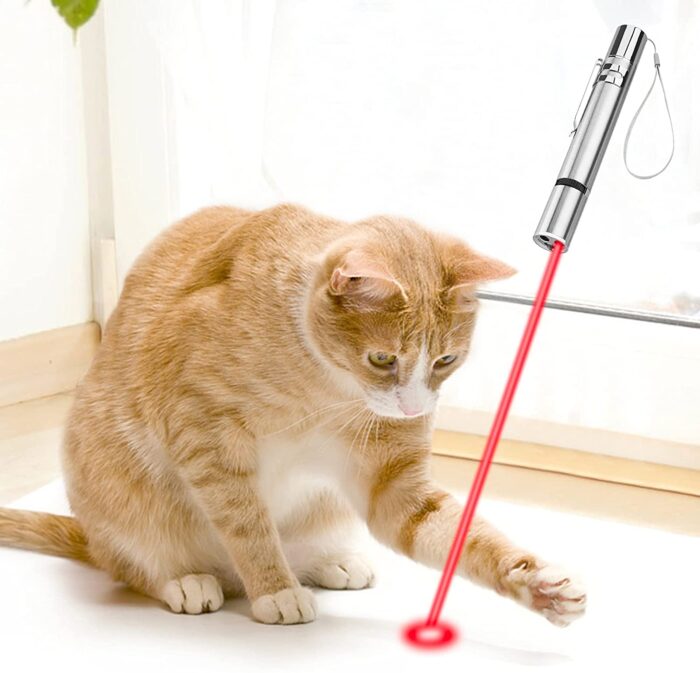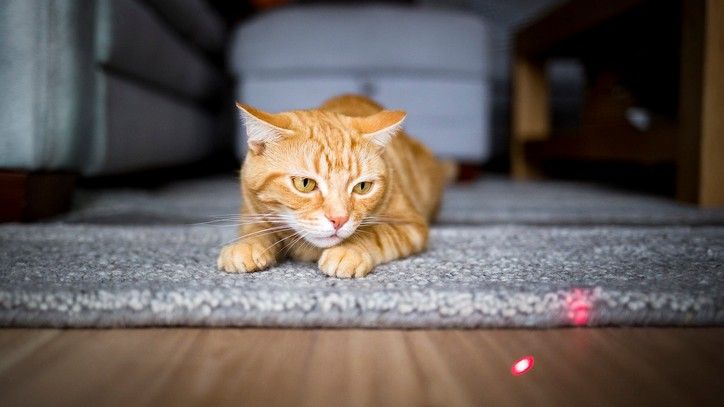Watching your cat stalk, chase, and pounce on a red laser dot is incredibly entertaining.
As natural hunters, cats do what it takes to catch the ‘prey’ moving right before their eyes.
The frantic movements of the laser toy trigger the feline prey drive and get them in action.
To your kitty, the laser toy is a live animal worth being tracked down and killed.
The whole idea of using laser toys on cats continues to spark different emotions among many cat parents and enthusiasts.
Some argue that lasers are beneficial to cats in many ways—that they essentially cater to the kitty’s physical and mental health.
On the other hand, there are concerns that the toys give the cat anxiety. The reason is that it frustrates the felines who hope to catch prey at the end of the chase.
So, where does the truth lie? Do laser toys truly give your cat anxiety?
Cats and Lasers
Cat parents find toys to be invaluable to pet parenting. Cats, unlike dogs, don’t fancy playing with their human parents.
Sure, some may play with you or the kids from time to time but they always retreat to their own worlds shortly after.
Lasers, among other cat chaser toys, grab their attention deeply. They cater to their instinctual need to hunt.
As the laser unpredictably moves across the room, it stimulates the cat to get up and play with you. Who doesn’t enjoy special bonding time with their cat?
Most importantly, lasers are good for the cat’s physical and mental stimulation.
According to PetMD, cats are sedentary and tend to become bored, obese, and aggressive.
Laser pointers solve all three issues and more. As the cat chases after the moving laser toy, she flexes her muscles and runs or jumps around.
The energy expended keeps her fit and maintains a healthy weight.
Additionally, going after and pouncing on a laser toy gives your kitty a great sense of fulfillment.
Ultimately, it kills boredom and ensures that the cat is happy and content.
Lasers are also easy to use. They allow you to interact and exercise your kitty from just about anywhere in your house.
Whether you are lying in your bed, enjoying a good book, or binging some Netflix, you can still play with your cat seamlessly.
Do Laser Toys Cause Anxiety in Cats?

As mentioned before, cats love playing with laser toys because they trigger their prey drives.
However, they don’t offer the closure the felines receive after a hunt. In other words, our cats don’t get to capture the prey and kill it.
For this reason, they may get extremely frustrated with laser toys.
As a hunter, a cat knows that every hunt doesn’t necessarily guarantee good success.
Sometimes she comes up empty despite stalking and chasing prey all day long.
Still, she eventually manages to catch her prey another day. With laser pointers, prey is primarily never caught.
Some cats can become anxious when the hunt always ends up in failure. They may or may not develop destructive habits as a result. These include scratching furniture and carpets or breaking prized possessions at home. Nobody wants a cat that is out of control like that.
To make matters worse, laser toys can also trigger the compulsive disorder in your kitty. What this means is that certain cats tend to chase anything and everything that looks like a laser.
Instead of eating or playing with his owners, the kitty will start running after reflections or shadows. This is according to Dr. John Ciribassi, DACVB, and DVM.
Writing to DVM 360, Dr. Ciribassi explained that laser points can indeed affect the quality of life of cats.
Finally, a laser point toy may exhaust or overstimulate your cat.
As you hold the laser and let your kitty chase around it, you may unknowingly make the game difficult for your cat to a point where she is out of breath.
As a result, your cat may get stressed out as she wants to keep playing with you but is physically worn out.
Other Dangers of Laser Pointers
Besides the triggering anxiety, laser pointers also come with some cons for your cat.
A. Risk for Injury
The most common drawback of using laser toys to play with your cat is the risk of injury.
As the feline stays laser-focused on the moving light beam, she may stop looking at her surroundings.
She is likely to jump too high up a wall and come down crushing or hit a corner with sharp objects.
B. Eye Damage
Pointing a laser beam straight into a cat’s eye can damage its retina. This is especially true for laser beams of more than 5 milliwatts.
According to the American Academy of Ophthalmology, lasers with an output power of more than 5 milliwatts interfere with the natural protective mechanisms of a cat’s eye like the blink reflex, and may even cause severe retinal damage.
Thankfully, most models are safe for animal and human use. Nevertheless, some manufacturers out there don’t care about your pet.
If you aren’t sure of the best brand or don’t have the time to choose the best laser pointer for your cat, get PetSafe Dot Laser Pointer. It is designed with a Certified Class 1 laser, which is completely safe for your fur baby.
C. Aggression
Some people associate laser point toys with aggression and bad behaviors in cats like biting and clawing furniture.
They believe that lack of closure or the inability to catch prey (light) may prompt the cat to pent up bad behavior.
While these claims are not scientifically-backed, cat parents have reported felines that became paranoid or anxious after playing with laser point toys—skulking around the house and chasing lights or dots that disappeared hours ago.
Should You Ban Laser Toys Once And For All?

While a laser toy can cause anxiety in your kitty, it is not necessarily a bad thing to have.
It offers more benefits for your kitty than other toys. Also, you can make some adjustments to ensure that the laser toys do not trigger anxiety.
So, you don’t have to toss them completely. Instead, exercise the following safety tips for using them.
1. Understand your cat
Not all cats fancy fast-moving laser toys. Some kitties prefer those that don’t move in frantic and rapid strokes.
If you own such a cat, take things slowly. At first, move the beam just a few feet away in small prey-like movements.
Increase the speed and direction of the beam but don’t go overboard. If things are too fast for your cat, he may lose interest in the game altogether.
In case she loses interest or doesn’t seem to be interested in the game, consider combining the toy with some catnip to make it more exciting for her.
2. Offer a reward
Who says that cats don’t catch prey when playing with lasers? They can if you occasionally point the laser in some sort of a toy.
After playing with the cat for a while with no prey caught, grab one of the cat’s favorite stuffed animals and run the laser beam over it.
Sure, she will soon know that the thing is not alive but he will feel fulfilled nonetheless.
3. Diversify
Laser toys are best used alongside other cat-favorite toys. This breaks the monotony that follows the act of playing with one toy for a long time.
Try dangling toys, puzzle games with treats, and stuffed animals.
Most importantly, find time to play with the cat without any toy.
4. Safety First
When playing with a laser toy, don’t point it too high for the cat. Also, keep it off of breakable items.
Minimize potential danger and margins for error by opting for lower playing levels and areas with softer and stable landings.
Every time you decide to interact and exercise your kitty with a laser point toy, ensure that you do so in an open space where she is not likely to hurt herself.
And when shopping for a laser toy, pay attention to the wattage of the laser beam.
5. Supervise
For your kitty’s safety, avoid automatic lasers unless you are around to monitor your cat.
Supervising your cat play with automated lasers or manually operating one yourself gives you a good opportunity to not only limit the areas of play but also keep your feline friend from prolonged exposure to the laser pointer.
6. Use the right laser toy
Although most laser toys that you’ll find on the market today are safe for human and pet eyes, not all of them are up to the code.
Consequently, opt for brands that clearly indicate that they are safe cats.
Avoid modified lasers, high-powered lasers (above 5mW of power), or lasers that aren’t specifically designed for cats. They can be harmful to your kitty’s health.
7. Don’t Overstimulate your cat
Chasing and catching a laser is exhausting. As you hold and let the cat chase the laser, her instincts will prompt her to remain relentless in the hunt, which can easily overstimulate and exhaust her.
To avoid this, limit playtime depending on your kitty’s activity level and age.
And if you notice any sign of overstimulation or exhaustion, take a break and let your cat relax to catch her breath.
Learn more about cat overstimulation here: Overstimulation in Cats Explained
FAQs

A. Why do cats like Laser Light Pointers So Much?
The short answer is because of the motion of these toys. The laser pointers can move in an erratic, unpredictable, and fast-paced manner, which mimics how preys move in the wild.
So, lasers quickly trigger your kitty’s intense urge or instinct to hunt and kill. She perceives the red light as prey that she can catch, maul, and eat.
Playing with a laser pointer is also addicting to cats as they never truly win and catch the red light, so they keep playing thinking that they will at least catch it.
Finally, felines have more photoreceptor rod cells compared to humans, which translates to superb peripheral vision. This also makes them excellent at tracking movement.
Playing with a laser is, therefore, a great stimulus not only for their hunting instincts but their eyeballs as well.
B. Is It Cruel To Use A Laser Pointer With A Cat?
No. When used in the right way (as discussed above), laser pointers aren’t cruel to cats.
The main concerns when using laser pointers like effects on kitty eyes, hazards, and anxiety are things that can be eliminated if you use the laser pointers responsibly.
If anything, a bigger percentage of indoor cats end up being obese at some point in their lives, and one of the main contributors to this is lack of exercise.
Laser pointers are excellent toys that can help you deal with such issues by keeping your feline friend active and running throughout the day.
C. Do laser pointers give cats OCD?
Unfortunately, laser pointers are linked to cats developing OCD symptoms if this study is anything to go by.
According to the study, some cats have displayed self-directed aggression behaviors (chasing light reflections, staring into shadows, biting their own tails, etc) after playing with lasers for long.
The findings are also supported by Karen B. London, Ph.D, an Applied Animal Behaviorist and Certified Dog Trainer, who stated that a lot of pets have become obsessive about the light from laser pointers, and there are several cases of pets that have been diagnosed with OCD (and perhaps partly) as a result of being exposed to laser pointers.
While treatment of OCD in cats isn’t common, there are quite a number of treatments that can be leveraged to reduce such behaviors.
Besides, offering some form of rewards at the end of a play session can reduce the harmful effects—your cat will not be left frustrated, confused, and dissatisfied.
D. Do Laser Make Cats Crazy?
Well, because of the erratic motion of the laser light, your kitty may act a bit crazier than normal while trying to chase the toy.
And as we have seen above, laser pointers are linked to cats developing OCD symptoms. So, some cats may do crazy things like biting their tails, chewing furniture, or staring at shadows after playing with a laser pointer.
The main trigger of such behaviors is lack of closure, making the cat feel anxious and act out of frustration.
But it is something that can be corrected, for example, by rewarding your cat after playing to assuage her aggression.
Additionally, if you notice your kitty acting crazy after playing with a laser pointer, consider switching to another toy that can fulfill his urge of catching prey—flopping fish cat toys are perfect examples of toys you can opt for.
E. What Color Laser Pointer Is Best For Cats?
Generally, it is the motion of the laser light that cats chase or respond to—not the color.
In other words, cats are more interested in the light from the laser than the color.
The same way humans can see light and shadows in black and white movies, our feline friends can still tell that a laser dot is brighter than the surroundings irrespective of its color.
That said, most laser pointers for cats are typically red. The red color is considered to be less powerful in terms of wattage, safer for cats’ retinas, and visible to most cats.
Closing Thoughts
Laser pointer toys are beloved by cats worldwide. Felines relate to them because they trigger their natural inclination to hunt.
Honestly, it can be a bit challenging to find activities that our kitties genuinely love to engage in, so a laser pointer toy is a massive win, particularly if your cat loves it.
Sadly, they can cause stress and anxiety for some cats.
However, if you exercise the safety tips mentioned here, your kitty will be fine.
Most importantly, always keep in mind that there is no toy that can replace you to your fur baby. Always strive to spend some quality time with your kitty every day.

Hi! I am Eleanor Price. I started this website after my cat, Louie, almost died from a case of botulism (a type of food poisoning often caused by bacteria that grow on food items). Turned out that my cat’s diet was the problem. I have made it my duty to provide the best information and recommendations about everything cat lovers need to know about their felines’ health and wellbeing. My goal is to find the most informative content on anything feline-related and share it with fellow hardworking kitty lovers.

